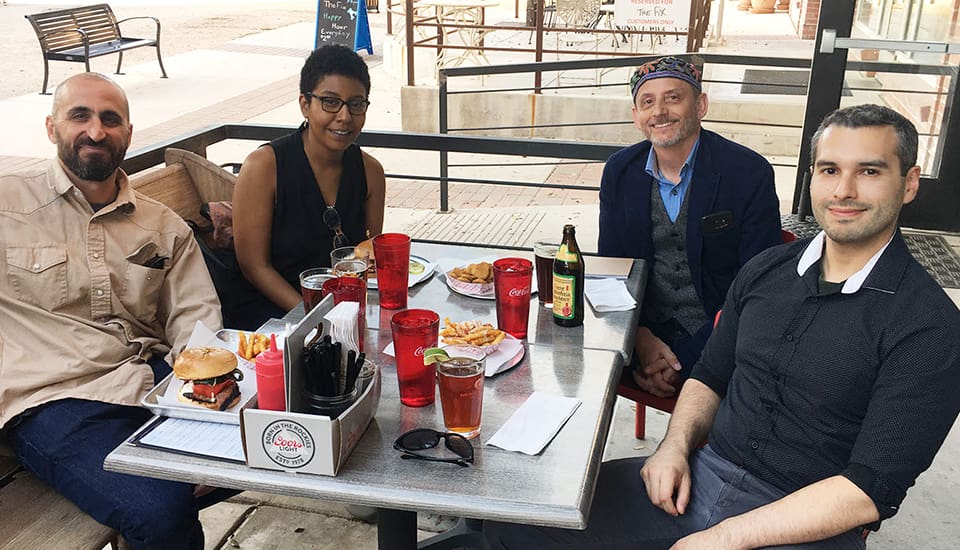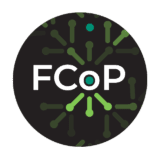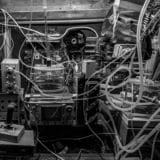University of Arizona
The Learning Games Initiative Research Archive (LGIRA), led by librarians at the University of Arizona in Tuscon, studies, teaches with, and builds computer games in educational contexts. The FCoP project aimed to bring together stakeholders and a community of interest around LGIRA, developing conversation and workflows around its “preservation through use” approach.
The project convened a community of practice in work and discussions that illuminate challenges around software preservation activities, and developed some initial digital workflows involving emulation. LGIRA’s “preservation through use” approach involves practitioners from diverse backgrounds, meaning that teaching, learning, and the development of a shared vocabulary around preservation and emulation became a core part of the project, while the “people first” community of practice approach centered people and learning communities as the main structure for preservation.
The Team

Judd Ruggill: Associate Professor, Head of Public/Applied Humanities (left)
Monique Lassere: Project Lead, Digital Preservation Librarian (second from left)
Ken McAllister: Professor, Associate Dean for Research and Program Innovation
Fernando Rios: Research Data Management Specialist (right)
Outcomes
The University of Arizona team created both documentation and burgeoning community through their Learning Games Initiative Research Archive project. Along with workflow documentation, walkthroughs, and emulation criteria, the team developed protocols and best practices for using and preserving software through use, as part of a community of practice.
Outreach and community building were key aspects of the team’s approach, and they developed pedagogical tools and insights for fostering community and sharing knowledge. Their contributions highlight the importance of building shared understandings, and building sustainability into complex projects.

Sustaining Software Preservation Efforts Through Use and Communities of Practice
This paper, presented at the International Digital Curation Conference, describes the University of Arizona’s project and community-centered approach to preservation through use.
FCoP, Research, Resources
Insights
- Sustaining a software preservation project is often challenging, with limited budgets, capacity, and time, and diverse software objects. Building a community of practice around using, preserving and fixing software and hardware can be one strategy for improving project sustainability.
- Consider a “preservation through use” approach. Unlike traditional archival approaches, preservation through use means preserving software heritage by staying familiar with how it feels, looks, and works. That is, keeping software and hardware in circulation and having people use it. It refers to the understanding that the act of preservation extends beyond the physical preservation of objects and further towards human capacity for memory-making.
- People first: the community of practice approach treats people and learning communities (rather than property/objects) as the main structure for preservation.
- When dealing with an interdepartmental project or a preservation community of practice, there is often a challenge in getting to a shared understanding or shared vocabulary. A glossary may be necessary to ensure folks are on the same page.
- The need for common conceptual frameworks, lexicons, and taxonomies in cross-domain collaborations is vital to software preservation if only because so many technical and disciplinary discourses are always at play within any such initiative.
Reflections

FCoP 2020 Cohort Reflections: University of Arizona
Like many institutions of higher education, the University of Arizona (UA) is currently evaluating ways to mitigate the significant economic impacts of the COVID-19 pandemic by finding ways to cut costs across all areas of the research enterprise. These include …Continue FCoP 2020 Cohort Reflections: University of Arizona
Cohort Reflections, FCoP, News

FCoP 2019 Cohort Reflections: University of Arizona
As the project lead for the University of Arizona FCoP project team, I’ve realized that preserving and providing access to software is a lot like a jigsaw puzzle for three reasons: 1) it takes (a lot of) time to put …Continue FCoP 2019 Cohort Reflections: University of Arizona
Cohort Reflections, FCoP, News
Workflows

University of Arizona: Born Digital Media Request Workflow
This document describes the steps involved in on-demand born-digital processing at University of Arizona Libraries. Steps include: Initiating a request Acquisition Research and testing Forensic capture and preservation Forensic capture Staging Photograph media Forensic processing Virus check Sensitive data scan …Continue University of Arizona: Born Digital Media Request Workflow
FCoP, Resources, Workflow Documentation

University of Arizona: Commodore 64_128 Imaging Workflow
This document outlines the steps required to copy files from and create disk image of disks that were written using the Commodore 64/128. Sections include: Hardware and software requirements Installation/first-time set-up Connecting Zoom Floppy Copying Files and Programs Disconnecting the …Continue University of Arizona: Commodore 64_128 Imaging Workflow
FCoP, Resources, Workflow Documentation

University of Arizona: Disk Image Format Primer WIP
This document provides a broad overview on the practical uses of disk images as they pertain to archival practices and workflows. Sections include: What is a disk image? Why are disk images useful? How are disk images created? Types of …Continue University of Arizona: Disk Image Format Primer WIP
FCoP, Resources, Workflow Documentation

University of Arizona: Floppy Disk Workflow
This document describes the University of Arizona workflow for creating disk images of 3.5” and 8” floppy disks. Steps include: Pre-imaging: Cleaning and set-up Installing the Kryoflux and Software (first time) Connecting the Kryoflux to a born-digital workstation Configuring the …Continue University of Arizona: Floppy Disk Workflow
FCoP, Resources, Workflow Documentation

University of Arizona: Guidelines for Storing and Handling Removable Media
This document provides a list of external resources as well as detailed information regarding the storage and handling for magnetic and optical media storage formats including: Floppy disks Internal hard disks External hard disks CD-ROM CD-R CD-RW DVD Blue-Ray Flash …Continue University of Arizona: Guidelines for Storing and Handling Removable Media
FCoP, Resources, Workflow Documentation

University of Arizona: LGIRA Borrower Form
This document is a blank borrower form outlining the terms and conditions associated with borrowing materials from the LGIRA collection. The form also includes information about LGIRA including borrowing locations, contact information and co-director names.
FCoP, Resources, Workflow Documentation

University of Arizona: Selection for Emulation Criteria
This document is a scan of the LGIRA cataloging procedures for any new items that are added to the collection. There are specific instructions provided for different types of materials, including: Books Game software Magazines Videotapes Edible/Potable Materials Game Hardware
FCoP, Resources, Workflow Documentation

University of Arizona: LGIRA Data Entry Procedure
This document is a scan of the LGIRA cataloging procedures for any new items that are added to the collection. There are specific instructions provided for different types of materials, including: Books Game software Magazines Videotapes Edible/Potable Materials Game Hardware
FCoP, Resources, Workflow Documentation

University of Arizona: ZoomFloppy Walkthrough Commodore Setup
This document provides instructions for setting up the ZoomFloppy hardware and software, which enables users to connect Commodore 1541/1571/1581 and CBM IEEE-488 drives to a Windows, Mac, or Linux computer. The setup guide includes: Links to external documentation ZoomFloppy diagram …Continue University of Arizona: ZoomFloppy Walkthrough Commodore Setup
FCoP, Resources, Workflow Documentation

University of Arizona: EaaS Sandbox Workflow Instructions
This workflow document outlines the steps for creating an emulation environment in the University of Arizona EaaSI sandbox. The sequence of steps assumes that the user is accessing the service for the first time. If you are returning to a …Continue University of Arizona: EaaS Sandbox Workflow Instructions
FCoP, Resources, Workflow Documentation

University of Arizona: Workflow Documentation Diagram
The diagram refers to the Workflow Documentation master document linked below.
FCoP, Resources, Workflow Documentation

University of Arizona: Workflow Documentation
This LGIRA workflow document includes detailed descriptions of the following stages: Appraisal: Determining the value of materials; can occur prior to or after acquisition Acquisition: Acquiring materials, physical transfer of materials from creator/owner to archive Accessioning: Process of creating a …Continue University of Arizona: Workflow Documentation
FCoP, Resources, Workflow Documentation
Conferences & Presentations
Software Preservation Interest Group (SPIG) presentation 11/8/2018
By: Monique Lassere, Fernando Rios, Judd Ruggill, Ken McAllister
Link: https://osf.io/uh4vr/
Software Preservation Interest Group (SPIG) notes 11/8/2018
By: Monique Lassere, Fernando Rios, Judd Ruggill, Ken McAllister
Link: https://osf.io/5qwpa/
Software Preservation Interest Group (SPIG) presentation 1/15/2019
By: Fernando Rios, Monique Lassere
Link: https://osf.io/2wrqc/
Software Preservation Interest Group (SPIG) notes 1/15/2019
By: Fernando Rios, Monique Lassere
Preserving Research Software RezBaz 2019 Session Presentation
By: Monique Lassere, Fernando Rios, Judd Ruggill, Ken McAllister
Link: https://osf.io/36atx/
By: IDCC Conference Presentation Slides
Fernando Rios
All-Cohort Exercises

Georgia Tech: Scenarios for (Re)Use and Access
This worksheet includes several key sets of work by the retroTECH team: Detailing scenarios for use and access which includes: Types of stakeholders involved in each use case Defining the user’s goals or what they want to so with software …Continue Georgia Tech: Scenarios for (Re)Use and Access
All-Cohort Exercises, FCoP, Resources

Georgia Tech: FCoP Project Plan
This document includes a detailed six month project plan which outlines milestones and intermediate sets of work that the retroTECH team undertook to achieve those milestones.